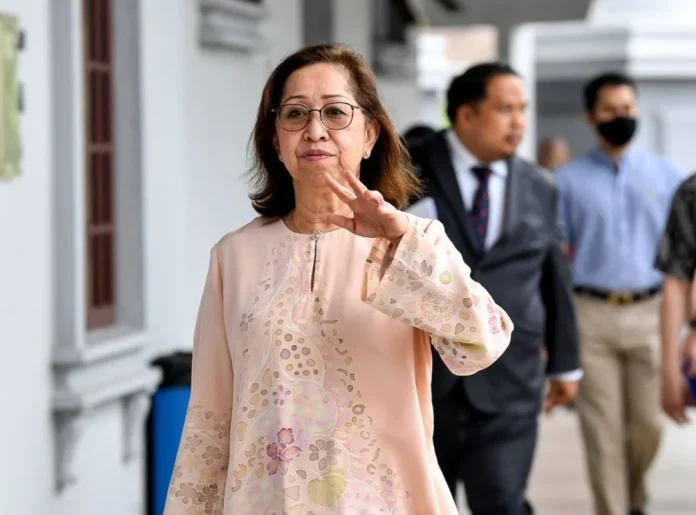Toh Puan Na’imah’s case may be reassigned to another High Court judge as prosecution pushes to expedite hearing.
KUALA LUMPUR: The prosecution has requested that Toh Puan Na’imah Abdul Khalid’s application to refer eight legal questions to the Federal Court be heard by another High Court judge.
Deputy public prosecutor Mohd Fadhly Mohd Zamry informed Sessions Court Judge Azura Alwi that the request was made during today’s mention before High Court Deputy Registrar Nur Liyana Mohd Sulaiman.
“Our application for the legal questions to be heard by another High Court judge is intended to expedite the hearing process,” said Mohd Fadhly.
He explained that the Deputy Registrar informed them there is currently no replacement for the High Court (Criminal 2) judge following Judge K. Muniandy’s appointment to the Court of Appeal.
The court has fixed November 21 for the next mention to update whether the hearing will remain under High Court (Criminal 2) or be transferred to another High Court.
Mohd Fadhly requested that the mention for Na’imah’s asset declaration case at the Sessions Court also be set on the same date.
Judge Azura granted this request.
On August 21, Judge Muniandy allowed Na’imah’s application after ruling that the legal questions raised were not frivolous or an abuse of court process.
This overturned an earlier Sessions Court decision.
Na’imah filed the application to refer legal questions relating to Sections 30(5), 36(2) and 62 of the MACC Act 2009, as well as Section 32(3)(b) of the Anti-Money Laundering Act on February 29 last year.
On February 18, Judge Azura dismissed the application on grounds that it lacked merit as no constitutional issues were raised.
Na’imah, widow of the late former Finance Minister Tun Daim Zainuddin, was charged in the Sessions Court on January 23 last year with failing to comply with a notice to declare her assets.
The assets included Menara Ilham and several properties in Kuala Lumpur and Penang.
She was charged under Section 36(2) of the Malaysian Anti-Corruption Commission Act 2009.
The charge carries a maximum sentence of five years imprisonment or a fine of RM100,000 upon conviction. – Bernama








